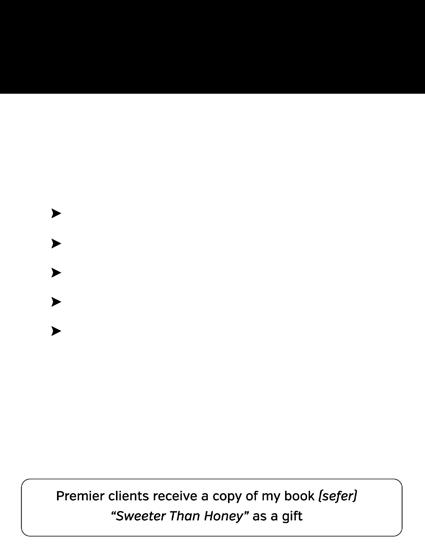
10 minute read
Rabbi Wein on the Parsha
Torah Thought
Parshas Vayishlach
By Rabbi Berel Wein
One of the more perplexing questions that is raised in this week’s Torah reading is why Yaakov sends agents and messengers to Eisav to inform his brother of his return to the Land of Israel. King Solomon in Proverbs had already advised to let sleeping dogs lie, so to speak. So why should Yaakov place himself in a situation of anticipated danger and difficulty when it could have been avoided?
There are many insights and comments that have been expressed over the ages regarding this problem. I will take the liberty of adding my ideas to possibly explain this quandary.
We all are aware that deep within each of us there is a psychological im-
Low Cost Quality Insurance
Our Specialty
Free Consultation Free Policy Evaluation
SPECIAL DISCOUNTED PROGRAMS FOR A SYNAGOUGE,YESHIVA, NURSING & ADULT HOME FACILITIES (SAVE UP TO 50% AND MORE)
Large Commercial Insurance Policies Life Insurance Disability Insurance Self Employed Health Insurance Long Term Care Insurance






Rabbi S. M. Leiner, CLTC Licensed Independent Broker for all types of Insurance Call: 917-543-0497 - Leave a message
Mail: Rabbi S. M. Leiner, CLTC P.O. Box # 7655 600 Franklin Ave. Ga Garden City, NY 11530 petus to attempt to correct what we may deem to be a past error of judgment or behavior. In fact, the entire Jewish concept of repentance is built on this and can be mobilized for good and positive purposes. This impulse is usually sublimated when current events constantly impinge upon our lives.
We are busy making a living, raising a family, engaging in a profession or business, studying or teaching, and we have little time to think and recall all our past misdeeds and errors. In fact, we become so involved in our lives, that we almost forget our past behavior and less-than-noble life patterns. But, as is often the case, the past gnaws upon us and eventually gives us no rest until and unless we attempt to somehow correct what we feel was wrong and even shameful.
Yaakov is aware that he obtained both the birthright and the blessings from his brother by questionable means. This matter has been discussed for millennia, and we have alluded to the many insights, interpretations, comments, and explanations for the behavior of Yaakov. Nevertheless, the issue remains basically unresolved, for the verses in the Torah remain explicit, unchangeable, and eternal. It is, then, perfectly understandable that our father Yaakov should try somehow to make amends to his brother for the past times that Eisav, wrongly or rightly, felt that he was taken advantage of and deprived of what was really his.
Considering this, it is perfectly understandable why Yaakov behaves in the way he did and bestows upon Eisav such exaggerated gifts. It may be his attempt to square things and to defuse the bitterness of the past. It is not so much that Eisav should be mollified, but, rather, that Yaakov
should become refreshed and more at peace with himself regarding his eternal mission of building the Jewish people – a mission which requires that he possess the birthright and the blessings of his father Yitzchak.
Only people who are at peace with themselves can really be constructive and positive in life, for them and others. It is this realization that impels Yaakov to seek out his brother before establishing himself in the Land of Israel and beginning to fulfill the mission and the blessings that were rightly given to him.
Shabbat shalom.

From the Fire
Parshas Vayishlach The Many Faces of Evil
By Rav Moshe Weinberger Adapted for publication by Binyomin Wolf
The Torah tells us that the night before Yaakov planned to confront Eisav and his four hundred soldiers, (Bereishis 32:25) “And Yaakov was left alone and a man struggled with him until the break of dawn.”
There is a fascinating dispute in the Gemara (Chulin 91a) regarding the appearance of this man with whom Yaakov wrestled, who we know was the ministering angel of Eisav and represents the yetzer hara, the Evil Inclination: “Rabi Shmuel bar Nachmeini says that he [the man] appeared to him [Yaakov] like an idol worshiper.... Rav Shmuel bar Acha said before Rav Papa in the name of Rava bar Ula that he [the man] appeared to him like a Torah scholar.” The Mussar seforim explain that the deeper meaning of this Gemara is that the Evil Inclination constantly changes its approach and its tactics depending on the situation. The Gemara (Sukka 52a) even says that the Evil Inclination goes by seven different names since it takes on a different approach depending on the person and the circumstances.
The tests of this world are always changing. As Rav Moshe Chaim Luzzatto, in Mesillas Yesharim, writes, “All aspects of this world, whether good or seemingly bad, are tests for a person; poverty on one hand and wealth on the other...” We see a clear example of this in Lot, Avraham Avinu’s nephew. When it came to the test of poverty, he passed with flying colors. When Avraham had to descend to Egypt because of the famine, Lot went with him into exile and stayed strong. But while in Egypt, Avraham, and Lot as well, became very wealthy, as the pasuk says (Bereishis 13:2), “And Avraham was very heavy with cattle, with silver, and with gold.” Unfortunately, when it came to wealth, Lot failed the test. He chose Sedom over Avraham, saying (Rashi on Bereishis 13:11), “I cannot stand Avram or his G-d.” Lot passed the test of poverty but failed the test of wealth.

There was a wealthy benefactor in Mink, who supported all of the yeshivos and poor people of Minsk, named Reb Boruch Zeldhovitz. Unfortunately, after some time, he lost everything he had and became so poor he could scarcely feed his family. He traveled to Brisk to meet Rav Chaim Brisker. When he spoke with him, he asked: “Doesn’t it say in Mishlei 28:27, ‘One who gives to the poor will lack nothing’? Indeed, the Rambam paskens (Mishna Torah, Matnas Aniyim 10:2) that the halacha is that ‘a person will never become poor from giving tzedaka and no damage or anything bad will happen to the person because of giving tzedaka.’ If so, how could I have become so poor after giving so much tzedaka?”
Rav Chaim answered him with a story from his father, the Beis Halevi.
Soon after the Beis Halevi became the Rav in Brisk, he went to the Jewish cemetery in Brisk for the first time to attend a funeral. While he was there, he noticed a very unusual thing. He saw a man’s matzeivah with the pasuk (Mishlei 31:20), “Her palm is open to the poor and her hand is stretched out to the destitute,” quoting from a pasuk from Eishes Chayil, the song in praise of the Jewish woman, the Woman of Valor. He was very curious about the choice of pasuk because psukim from Eishes Chayil are usually reserved for women. After the funeral, he went to the cemetery office and researched the man’s family. After learning more, he followed up with some of the older Jews in Brisk to learn more about the man.
The Beis Halevi’s research revealed several interesting things about this fascinating person. He had been very wealthy, supporting all of the local institutions and poor Jewish people. After doing so for a long time, his fortune took a turn for the worse and he lost everything. One day, after becoming poor, two poor men came to his home for tzedaka. At first, he told that that he was terribly sorry but that he did not have anything left to give them. Despondent, they were about to walk away, when the man said to hold on and that he would check whether he could find anything to give them. He began rifling through boxes, and at one point, he lifted up a box and a small silver spoor fell to the floor. Ecstatic that he was able to give something to the poor men at his door, he returned to them. Because there were two men and only one spoon, he broke the little spoon in half and gave a piece to each one.
It was because of this story that the community wrote the pasuk, “Her palm is open to the poor,” on his tombstone. The Hebrew word for “her palm,” kapah, also means “spoon,” and the Hebrew word for “open to,” paschah, also means “to divide.” He divided the spoon in half, giving the usable portion of the spoon to one poor person. And in the second half of the pasuk, “her hand is stretched out to the destitute,” the Hebrew word for “her hand,” yade’hah, can also refer to the “handle” of the spoon, as if to say that he gave the handle to the “destitute,” the other poor man. After this man’s funeral, the Beis Din in Brisk began debating how such a giving person could have become so poor. They
concluded that it must be because he transgressed the words of Chazal (Erchin 28a) by giving away more than a fifth of his wealth.
Reb Baruch Zelchovitz spoke up, saying, “I understand the Rebbe’s point. I am being punished because I violated the words of Chazal by giving away more than a fifth of my assets to tzedaka.” “No!” Reb Chaim responded. “I disagree with the Beis Din. But I do not see any difficulty in understanding how a rich person who gives tzedaka could lose all of his money. Our world is a test. At first, you were tested with wealth and you passed that test. You are now being tested with the challenge of poverty. How will you fare?”
Chassidus calls this world an ever-changing place. Sometimes our Evil Inclination appears like an idol worshiper, attempting to entice us to do terrible sins. Other times, it appears like Torah scholars attempting to fool us into believing that some haughtiness or false piety is truly a great mitzvah. The Mishna in Avos (2:5) says, “Do not believe in yourself until the day of your death.” Because one’s tests always change, one can never rest on his laurels even on his dying day.
According to the Gemara (Kiddushin 30a), not only does a person’s Evil Inclination strengthen itself against him every day, “a person’s evil inclination renews itself against him every day.” It places new tests before the person every day. The fact that someone passes a test one day does not guarantee that he will pass the next day’s test. The main thing is to recognize the battle and engage in the struggle without running away.
The Rashbam explains that the angel with whom Yaakov wrestled fought with him all night to prevent him from avoiding the confrontation with Eisav. It was as if he was saying to Yaakov, “No more running! You ran away from Eisav years ago and you ran away from Lavan. Now you wish to run away from Eisav again to avoid the confrontation?!” He therefore fought with Yaakov all night so that he would be forced to fight and would not be able to run away. According to the Rashbam, the prohibition against eating the gid hanasheh, the sinew injured by the angel, is meant to serve as an eternal reminder not to run away from our battles with the side of evil. Rather, we must engage in battle with it, in whatever guise it appears.
In both our internal and external battles with the side of evil, may we merit to always stand ready to engage in battle no matter what form our enemy takes and may we soon see the fulfillment of the last pasuk in this week’s haftara (Ovadia 1:21), “And the saviors will ascend the mountain of Zion to judge the mountain of Eisav, and kingship shall belong to Hashem.”

Rav Moshe Weinberger, shlita, is the founding Morah d’Asrah of Congregation Aish Kodesh in Woodmere, NY, and serves as leader of the new mechina Emek HaMelech.










